Beautiful Norwegian actress and singer Kirsten Heiberg (1907-1976) was the femme fatale of the German cinema of the Third Reich. The Ufa considered her as a replacement for Marlene Dietrich after the latter left for Hollywood. ‘Die Heiberg’ was one of the most interesting and talented Ufa stars, but unfortunately, she stayed somewhat in the shadow of Zarah Leander.
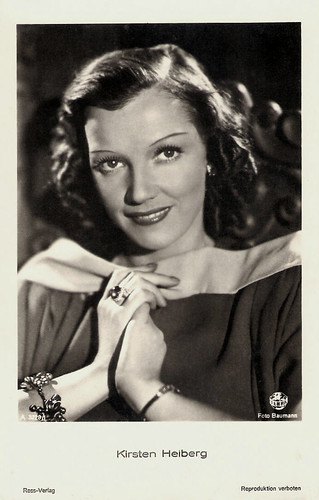
German postcard by Ross Verlag, no. A 3228/1, 1939-1940. Photo: Baumann / Terra.
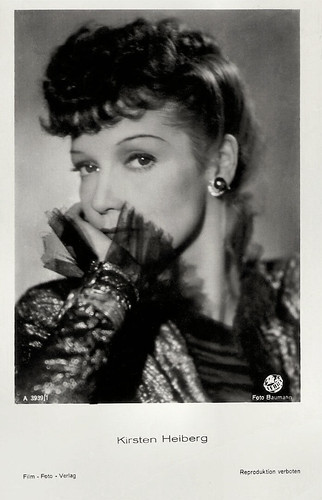
German postcard by Film-Foto-Verlag, no. A 3939/1, 1941-1944. Photo: Baumann / Terra. Kirsten Heiberg in Die goldene Spinne/The Golden Spider (Erich Engels, 1943)
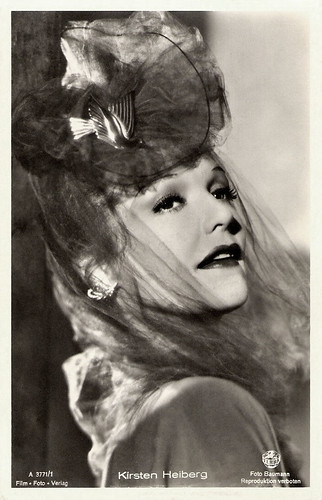
German Postcard by Film Foto Verlag, no. A 3371/1, 1941-1944. Photo: Baumann / Terra. Kirsten Heiberg in Liebespremiere/Love premiere (Arthur Maria Rabenalt, 1943).
Kirsten Heiberg was born in Kragerö, Norway, in 1907. Her father was a rich wood merchant. According to Wikipedia, she grew up in an artistic family, and her younger sister Else Heiberg later also became an actress.
She went to boarding schools in Lausanne, Dijon, and Paris. Later, she studied English in Oxford, England. Heiberg began her theatre career in her home country at Den Nationale Scene in 1929, and in the 1930s she appeared at the Carl Johan-Teatret and Scala Revyteater in Oslo. She made her cinema debut in 1934 with the Norwegian film Syndere i sommersol/Sinners in Summertime (Einar Sissener, 1934). This was followed by more Norwegian productions and some Swedish films.
In 1937 she went to Austria where she appeared on stage in the operetta revue 'Pam-Pam' at Theater an der Wien. There she met German film composer Franz Grothe. They married in 1938 and moved to Berlin. Grothe wrote numerous songs for his wife that suited her impressive alt. Curt Goetz engaged her for the film Napoleon ist an allem schuld/Blame it on Napoleon(Curt Goetz, 1938) starring Goetz and his wife Valerie von Martens.
This highly entertaining comedy marked Kirsten Heiberg's breakthrough. After the film, Goetz and Von Mertens fled Germany and moved to Hollywood. There Goetz was hired to work on various scripts at M.G.M. and given a 5-year contract. But Goetz and Von Martens chose to momentarily retire and became chicken farmers! During the war, he worked on his plays in the United States. Goetz's plays 'The House on Montevideo' and 'People Will Talk' were later filmed.
The Ufa presented Kirsten Heiberg as their new diva in Frauen für Golden Hill/Women for Golden Hill (Erich Waschneck, 1938) opposite Viktor Staal, and in the next years she played femme fatales in adventure and spy films like Alarm auf Station III/Alarm at Station 3 (Philipp Lothar Mayring, 1939) starring Gustav Fröhlich and Achtung! Feind hört mit!/Beware! The Enemy Is Listening! (Arthur Maria Rabenalt, 1940) with René Deltgen. In 1940 her career was halted when she refused to become a member of the Nazi party and didn't want to perform in her native Norway during the German occupation.

German postcard by Das Programm von Heute / Ross Verlag, Berlin. Photo: Terra / Quick.

Big card by Ross Verlag. Photo: Hämmerer / Ufa. Kirsten Heiberg in Frauen für Golden Hill/Women for Golden Hill (Erich Waschneck, 1938) with Viktor Staal
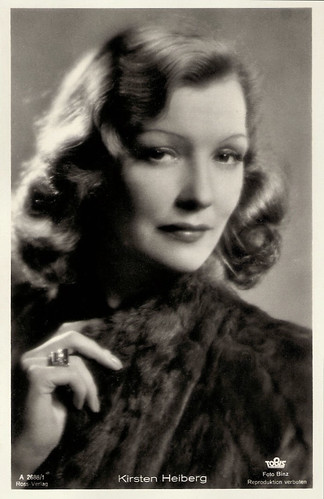
German postcard by Ross Verlag, no. A 2688/1, 1939-1940. Photo: Binz, Berlin / Tobis.
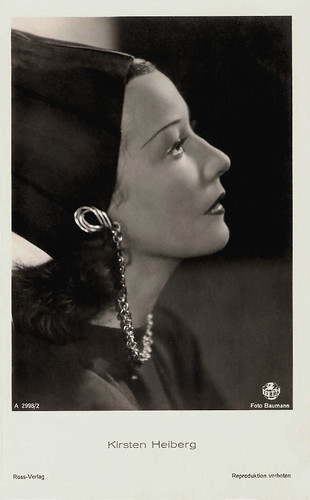
German postcard by Ross Verlag, no. A 2998/2, 1939-1940. Photo: Baumann / Terra.
Kirsten Heiberg returned in front of the cameras in 1942. Nowadays her best-remembered films are the Operetta Liebespremiere/Love Premiere (Arthur Maria Rabenalt, 1943) with Hans Söhnker and the historical disaster film Titanic (Herbert Selpin, Werner Klingler, 1943), about the sinking of the British luxury liner in 1912. At IMDb, Ralph Michael Stein writes: "It's not that common in movie history that a director angers the producer/distributor of his movie so much that the latter has the former murdered. That's what happened to co-director Herbert Selpin in 1942 before the release of Germany's film contribution to the Titanic saga. Dr. Josef Goebbels, Hitler's propaganda minister and self-anointed arbiter of culture in the Third Reich, had the Gestapo arrest Selpin who was reported dead in his cell the day after. Suicide? Ridiculous. (...)
Selpin (with co-director Werner Klingler) turned out a sumptuous, ornate and dramatically compelling movie. Largely using the known facts, Titanic tells the well-worn tale of a ship driven to unreasonable and dangerous speeds to set a record. There are some significant deviations. Here, the English first officer - seized with some malady - is replaced by a German seaman named Petersen, a model of experience and rectitude. J. Bruce Ismay, whose social life was justifiably ruined because he escaped the sinking behemoth, is unrealistically portrayed as a grasping cad whose crudity was not found in the self-absorbed, rich and supinely confident real shipping magnate. The vessel's master, Captain Smith, is overly subservient to Ismay but he responds well to the disaster. This movie wasn't made on the cheap. Given the deteriorating wartime situation, a lot of marks were expended on terrific sets and fine attire. There's no real Nazi propaganda. The movie ends with a comment that English greed occasioned the loss of so many lives but very many books and articles from Old Blighty and the U.S. echo that view. Because of its anti-British utterances, the Allies banned the movie in their sectors in Germany at first while it was freely available in the Soviet zone. Hardly a surprise-that movie maven, Stalin, probably loved this capitalist-bashing film."
Other well-known films were Die goldene Spinne/The Golden Spider (Erich Engels, 1943) and Philharmoniker/Philharmonic (Paul Verhoeven, 1944). With her dark timbre and her erotic appeal, she also became a popular singer. Many of her film songs were written by her husband, Franz Grothe, such as 'Ich bin wie ich bin' (I Am Like I Am) and 'Ich bin heut' frei meine Herrn' (Tonight I'm Free, Gentlemen).
After the war, a difficult time began for Kirsten Heiberg. Her marriage with Grothe went on the rocks and they divorced in 1951. Back in Oslo, she got no film offers because of her career in Nazi Germany. However, she was not arrested by the Norwegians since she was a German citizen at that time. She continued to work on stage and between 1952 and 1960 she worked for the Trøndelag Teater in Trondheim, acting in operettas, comedies, and serious classics and modern dramas.
Sometimes she returned to Germany to make a film, but she wasn't able to continue her earlier successes. Her later films are Hafenmelodie/Harbour Melody (Hans Müller, 1949) opposite Paul Henckels, Bei Dir war es immer so schön/It Was Always So Nice with You (Hans Wolff, 1954) with Heinz Drache, and the Norwegian drama Broder Gabrielsen/Brother Bill (Nils R. Müller, 1966). Shortly before her death, she made a cameo appearance in the German-Norwegian production Eiszeit/Ice Age (Peter Zadek, 1975) with O.E. Hasse. Kirsten Heiberg died in 1976 in Oslo, Norway. Among the few attending her funeral were her ex-husband Franz Grothe and his second wife Gerda. They always remained good friends and took her now orphaned dog Truks with them to Germany.
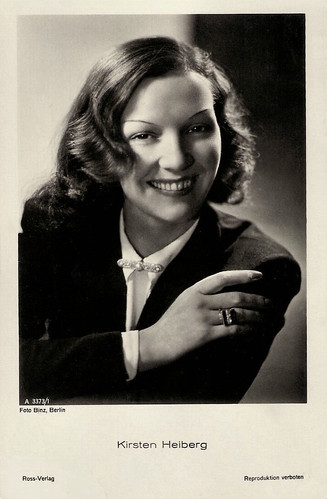
German postcard by Ross Verlag, no. A 3373/1, 1941-1944. Photo: Binz, Berlin.

German postcard by Film-Foto-Verlag, no. A 3504/1, 1941-1944. Photo: Binz, Berlin.

German postcard by Film-Foto-Verlag, no. G 150, 1941-1944. Photo: Star-Foto-Atelier / Tobis.
Scene from the operetta Liebespremiere/Love Premiere (1943) with Kirsten Heiberg singing 'Komm, Zauber der Nacht' (Come, Magic of the Night). Source: Alparfan (YouTube).
Sources: Thomas Staedeli (Cyranos), Ralph Michael Stein (IMDb - page now defunct), j-r årsheim (IMDb - page now defunct), Guy Bellinger (IMDb), Kirsten Heiberg Biographie Seite (German), Wikipedia (English and German) and IMDb.
This post was last updated on 2 September 2024.

German postcard by Ross Verlag, no. A 3228/1, 1939-1940. Photo: Baumann / Terra.

German postcard by Film-Foto-Verlag, no. A 3939/1, 1941-1944. Photo: Baumann / Terra. Kirsten Heiberg in Die goldene Spinne/The Golden Spider (Erich Engels, 1943)

German Postcard by Film Foto Verlag, no. A 3371/1, 1941-1944. Photo: Baumann / Terra. Kirsten Heiberg in Liebespremiere/Love premiere (Arthur Maria Rabenalt, 1943).
Sinners in summertime
Kirsten Heiberg was born in Kragerö, Norway, in 1907. Her father was a rich wood merchant. According to Wikipedia, she grew up in an artistic family, and her younger sister Else Heiberg later also became an actress.
She went to boarding schools in Lausanne, Dijon, and Paris. Later, she studied English in Oxford, England. Heiberg began her theatre career in her home country at Den Nationale Scene in 1929, and in the 1930s she appeared at the Carl Johan-Teatret and Scala Revyteater in Oslo. She made her cinema debut in 1934 with the Norwegian film Syndere i sommersol/Sinners in Summertime (Einar Sissener, 1934). This was followed by more Norwegian productions and some Swedish films.
In 1937 she went to Austria where she appeared on stage in the operetta revue 'Pam-Pam' at Theater an der Wien. There she met German film composer Franz Grothe. They married in 1938 and moved to Berlin. Grothe wrote numerous songs for his wife that suited her impressive alt. Curt Goetz engaged her for the film Napoleon ist an allem schuld/Blame it on Napoleon(Curt Goetz, 1938) starring Goetz and his wife Valerie von Martens.
This highly entertaining comedy marked Kirsten Heiberg's breakthrough. After the film, Goetz and Von Mertens fled Germany and moved to Hollywood. There Goetz was hired to work on various scripts at M.G.M. and given a 5-year contract. But Goetz and Von Martens chose to momentarily retire and became chicken farmers! During the war, he worked on his plays in the United States. Goetz's plays 'The House on Montevideo' and 'People Will Talk' were later filmed.
The Ufa presented Kirsten Heiberg as their new diva in Frauen für Golden Hill/Women for Golden Hill (Erich Waschneck, 1938) opposite Viktor Staal, and in the next years she played femme fatales in adventure and spy films like Alarm auf Station III/Alarm at Station 3 (Philipp Lothar Mayring, 1939) starring Gustav Fröhlich and Achtung! Feind hört mit!/Beware! The Enemy Is Listening! (Arthur Maria Rabenalt, 1940) with René Deltgen. In 1940 her career was halted when she refused to become a member of the Nazi party and didn't want to perform in her native Norway during the German occupation.

German postcard by Das Programm von Heute / Ross Verlag, Berlin. Photo: Terra / Quick.

Big card by Ross Verlag. Photo: Hämmerer / Ufa. Kirsten Heiberg in Frauen für Golden Hill/Women for Golden Hill (Erich Waschneck, 1938) with Viktor Staal

German postcard by Ross Verlag, no. A 2688/1, 1939-1940. Photo: Binz, Berlin / Tobis.

German postcard by Ross Verlag, no. A 2998/2, 1939-1940. Photo: Baumann / Terra.
Disaster
Kirsten Heiberg returned in front of the cameras in 1942. Nowadays her best-remembered films are the Operetta Liebespremiere/Love Premiere (Arthur Maria Rabenalt, 1943) with Hans Söhnker and the historical disaster film Titanic (Herbert Selpin, Werner Klingler, 1943), about the sinking of the British luxury liner in 1912. At IMDb, Ralph Michael Stein writes: "It's not that common in movie history that a director angers the producer/distributor of his movie so much that the latter has the former murdered. That's what happened to co-director Herbert Selpin in 1942 before the release of Germany's film contribution to the Titanic saga. Dr. Josef Goebbels, Hitler's propaganda minister and self-anointed arbiter of culture in the Third Reich, had the Gestapo arrest Selpin who was reported dead in his cell the day after. Suicide? Ridiculous. (...)
Selpin (with co-director Werner Klingler) turned out a sumptuous, ornate and dramatically compelling movie. Largely using the known facts, Titanic tells the well-worn tale of a ship driven to unreasonable and dangerous speeds to set a record. There are some significant deviations. Here, the English first officer - seized with some malady - is replaced by a German seaman named Petersen, a model of experience and rectitude. J. Bruce Ismay, whose social life was justifiably ruined because he escaped the sinking behemoth, is unrealistically portrayed as a grasping cad whose crudity was not found in the self-absorbed, rich and supinely confident real shipping magnate. The vessel's master, Captain Smith, is overly subservient to Ismay but he responds well to the disaster. This movie wasn't made on the cheap. Given the deteriorating wartime situation, a lot of marks were expended on terrific sets and fine attire. There's no real Nazi propaganda. The movie ends with a comment that English greed occasioned the loss of so many lives but very many books and articles from Old Blighty and the U.S. echo that view. Because of its anti-British utterances, the Allies banned the movie in their sectors in Germany at first while it was freely available in the Soviet zone. Hardly a surprise-that movie maven, Stalin, probably loved this capitalist-bashing film."
Other well-known films were Die goldene Spinne/The Golden Spider (Erich Engels, 1943) and Philharmoniker/Philharmonic (Paul Verhoeven, 1944). With her dark timbre and her erotic appeal, she also became a popular singer. Many of her film songs were written by her husband, Franz Grothe, such as 'Ich bin wie ich bin' (I Am Like I Am) and 'Ich bin heut' frei meine Herrn' (Tonight I'm Free, Gentlemen).
After the war, a difficult time began for Kirsten Heiberg. Her marriage with Grothe went on the rocks and they divorced in 1951. Back in Oslo, she got no film offers because of her career in Nazi Germany. However, she was not arrested by the Norwegians since she was a German citizen at that time. She continued to work on stage and between 1952 and 1960 she worked for the Trøndelag Teater in Trondheim, acting in operettas, comedies, and serious classics and modern dramas.
Sometimes she returned to Germany to make a film, but she wasn't able to continue her earlier successes. Her later films are Hafenmelodie/Harbour Melody (Hans Müller, 1949) opposite Paul Henckels, Bei Dir war es immer so schön/It Was Always So Nice with You (Hans Wolff, 1954) with Heinz Drache, and the Norwegian drama Broder Gabrielsen/Brother Bill (Nils R. Müller, 1966). Shortly before her death, she made a cameo appearance in the German-Norwegian production Eiszeit/Ice Age (Peter Zadek, 1975) with O.E. Hasse. Kirsten Heiberg died in 1976 in Oslo, Norway. Among the few attending her funeral were her ex-husband Franz Grothe and his second wife Gerda. They always remained good friends and took her now orphaned dog Truks with them to Germany.

German postcard by Ross Verlag, no. A 3373/1, 1941-1944. Photo: Binz, Berlin.

German postcard by Film-Foto-Verlag, no. A 3504/1, 1941-1944. Photo: Binz, Berlin.

German postcard by Film-Foto-Verlag, no. G 150, 1941-1944. Photo: Star-Foto-Atelier / Tobis.
Scene from the operetta Liebespremiere/Love Premiere (1943) with Kirsten Heiberg singing 'Komm, Zauber der Nacht' (Come, Magic of the Night). Source: Alparfan (YouTube).
Sources: Thomas Staedeli (Cyranos), Ralph Michael Stein (IMDb - page now defunct), j-r årsheim (IMDb - page now defunct), Guy Bellinger (IMDb), Kirsten Heiberg Biographie Seite (German), Wikipedia (English and German) and IMDb.
This post was last updated on 2 September 2024.
3 comments:
FANTASTIC ! Where does it come from. After silence around Kirsten Heiberg- for 50 years, suddenly an interest in her life and films are coming through. She certainly was a very talented and extraordinary beautiful woman. And she certainly deserves the new attention.
Best wishes for more Kirsten Heiberg attention !
The popular actress Kirsten Heiberg belonged to a small club of Norwegian actresses who became famous in foreign films. She had a fine film career in Germany
Beautiful Norwegian actress and singer Kirsten Heiberg (1907-1976) was the femme fatale of the German cinema of the Third Reich.
Post a Comment